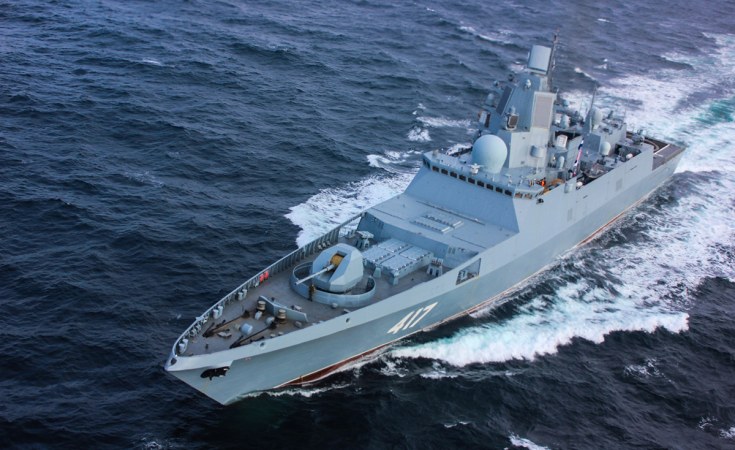Johannesburg — South Africa is under fire for hosting joint naval exercises with Russia during the one-year anniversary of the invasion of Ukraine, with critics saying it will be a propaganda victory for Moscow. But what does the third participant in the drills, China, have to gain from the tripartite exercises taking place this week?
Some analysts told VOA that, in China's case, Exercise Mosi II, off South Africa's east coast, is less about a real exchange of military prowess and more about important political and diplomatic optics.
"China has a lot to gain from these exercises," said Paul Nantulya, from the Africa Center for Strategic Studies in Washington. "It is sending a very powerful signal to other African countries that in-person military training is now back on the table. ... China and [its] People's Liberation Army are basically back" after years of closed borders during the pandemic.
He said the drills were also sending a message to China's competitors, namely the U.S., that Beijing has military clout in the region. The South Africa war games are taking place at almost the same time as the U.S. Army's Exercise Justified Accord in Kenya and just after U.S.-led maritime exercises off the Gulf of Guinea.
They also take place amid heightened tensions between Washington and Beijing in the wake of the U.S. shooting down an alleged Chinese spy balloon and after Secretary of State Antony Blinken warned that China is considering supplying Russia with weapons for its war against Ukraine.
Priyal Singh, a senior researcher at the Institute for Security Studies (ISS) in Pretoria, had a similar assessment.
"This assists Beijing in illustrating to the West [and the world in general] that it has a foothold in the South Indian Ocean through its strong relations with South Africa. I believe this may be important to China, given the geopolitical contestations being played out across the Indian Ocean region," Singh said in an email to VOA.
"I believe that the decision to proceed with these exercises was primarily driven by political considerations. Navies play important diplomatic and symbolic roles," Singh's ISS colleague Denys Reva added.
Darren Olivier, director at the African Defense Review, pointed out this week's naval exercises off South Africa are limited in nature and "focused mostly on basic maneuvers and light gunnery."
"It's important to note that South Africa has a NATO-oriented operational and tactical doctrine that's dissimilar to that of Russia and China, which inherently limits what can be done jointly, and unsurprisingly as a result, the exercise as described will not feature in-depth exploration or testing of any serious combat capabilities or procedures," he said.
Asked by VOA what China seeks to gain from the exercises, a spokesperson for the Chinese Embassy in the U.S. said "the joint maritime exercise held by the navies of the three countries in the southern waters of Africa is of great significance."
"It will help deepen the exchanges and cooperation among the navies, improve their ability to jointly respond to maritime security threats, demonstrate their determination to maintain regional maritime peace and stability and their good will and strong capabilities to actively promote the building of an ocean community with a shared future."
China, Russia and South Africa are all members of the BRICS grouping of emerging economies, which also includes India and Brazil.
Steve Tsang, director of the China Institute at SOAS University of London, said that for the People's Liberation Army Navy (PLAN) to join their Russian counterparts "in an exercise far away from China is highly beneficial," as the Russian navy is more modernized.
Asked whether such exercises could act as preparation for an invasion of Taiwan, Tsang said they were too different, but added that "enhancing the capacity of the PLAN to operate long-distance will be beneficial in general terms to enhancing its capacity in a Taiwan Strait crisis in the future."
The PLAN "need to train for long-distance deployments, particularly off Africa, where China is building up its interest," he said. China has invested heavily in the continent through President Xi Jinping's Belt and Road Infrastructure Initiative and is Africa's biggest trade partner.
But there are more than economic reasons for China to join the exercises, according to Nantulya. They include having the ability to protect the many Chinese nationals working in Africa -- the Chinese have been engaged in anti-piracy operations off Africa's East coast for years -- and maintain stability in countries that host Chinese peacekeepers or strategic investments.
Also, Nantulya said, it's possible Beijing -- which has only one military base in Africa, in Djibouti -- is looking to establish additional bases on the continent in the next decade.
The U.S. has raised concerns about a possible Chinese base in Equatorial Guinea on the Atlantic coast.
"In terms of Russia, I think it's quite obvious that what China has been doing is trying to provide Russia some form of platform to be able to continue conducting international relations despite the fact that it's been heavily sanctioned," Nantulya said. The war games that have been heavily criticized for taking place amid Moscow's invasion of Ukraine.
The U.S. State Department has told VOA by email, "We note with concern South Africa's plan to hold joint naval exercises with Russia and the PRC. ... We encourage South Africa to cooperate militarily with fellow democracies that share our mutual commitment to human rights and the rule of law."
According to Chinese state media, China has sent a destroyer, a frigate and a defense ship to the exercises in South Africa, which run until February 27.


